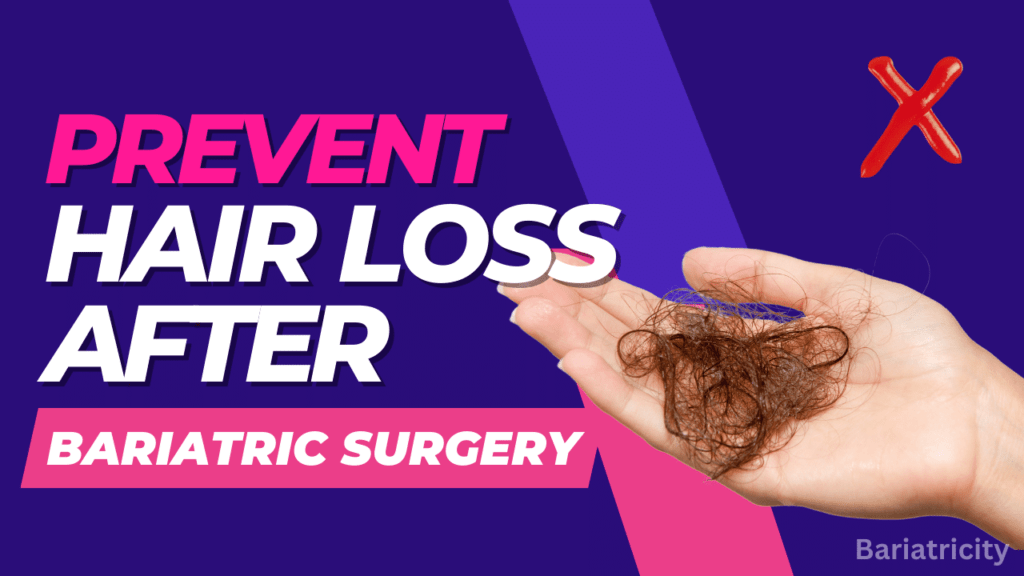If you start to notice your hair falling out after bariatric surgery, you are not alone! Hair loss occurs in over 80% of the patients we speak with.
Each type of bariatric surgery has different levels of hair loss. For example, gastric bypass and duodenal switch has more severe hair thinning and hair falling out due to the malabsorption component. Patient also may experience for up to 1 year. Compared to gastric sleeve surgery where hair loss is statistically shorter-term and less severe.
Regardless of weight loss procedure, hair loss is a side effect of not eating enough essential nutrients to supplement the body with what it needs to optimally function.
What causes hair loss after bariatric surgery?
The exact causes of hair loss is not 100% understood after weight loss surgery. We do know hair loss is directly correlated to nutrient deficiencies. Since gastric bypass and duodenal switch are malabsorptive procedures, they have a much higher rate of hair loss than gastric sleeve surgery.
With that being said, hair loss is a very real problem and most patients will experience it to some degree for a period of time after surgery. It will not last forever and there are some quick tips to restore hair growth and maintain healthy hair follicles.
What is causing your hair fall out?
There can be a variety of causes for hair loss. Every patient is different and will experience hair loss differently. What we do know, is hair loss can be caused by;
- Nutrient Deficiencies
- Iron – Iron deficiencies cause hair loss. Iron supplementation may be needed after bariatric surgery.
- Zinc
- Protein (first 8-12 weeks) – maintain protein intake
- Change in food intake (lack of calories)
- Rapid weight loss
- Stress to the body, anxiety, and hormonal changes after gastric sleeve, gastric bypass, or other bariatric procedures.
Check out the post-op diet to help maintain proper health and nutrition!
Hair Loss is Temporary
The good news – hair loss is usually a temporary change after bariatric surgery.
Hair loss is caused by the sudden changes to less food, low caloric intake, and less vital nutrients absorbed into the body. It also can be caused by stress to the body and hormonal changes that can occur after surgery – regardless if you had gastric sleeve or gastric bypass surgery.
Hair loss can begin for patients as early as 8 to 12 weeks post-op. Hair falls out relatively fast for 4-8 weeks and then begins to slow down. Hair loss almost never lasts for more than 1 year. Once the body acclimates to the smaller stomach and as the nutrient deficiencies balance out, it does grow back – usually at the 8 to 12-month post-op mark (95% or more).
Thin vs. thick hair
The amount of hair loss can depend on the amount of hair you have and the thickness of your hair. For example, if you have a lot of thick hair, the hair loss is less noticeable. Thin hair is more noticeable.
Patients begin to notice hair loss typically while brushing their hair.
How to prevent hair loss or restore growth?
Hair loss happens… Sometimes there is nothing to do about it – but there are things that can impact the amount of hair you lose – and the faster you bounce back and regrow hair.
- Biotin (B Vitamin) – Large doses 5,000 (5mg) to 10,000 (10mg)
- Protein Protein Protein – 60+ grams for women, 70+ grams for men.
- Take your bariatric vitamins that follow ASMBS guidelines.
- Monitor levels with blood tests from your primary care physician regularly.
- Maintain a healthy range of daily calories (1000-1200) from a variety of food groups
- Get to know your body physically and emotionally.
How to Avoid Hair Loss
There is no definitive answer for avoiding hair loss, yet there can be a few things that have worked for past patients. Protein and vitamins are absolutely critical – starting from one week after bariatric surgery and continuing for the rest of your life.
Remember to follow your doctor’s recommendations and advice before trying anything new. Sometimes you can only do so much. If nothing is working and blood tests come back with no deficiencies – you may have to just be patient and wait for your body to balance itself out.


